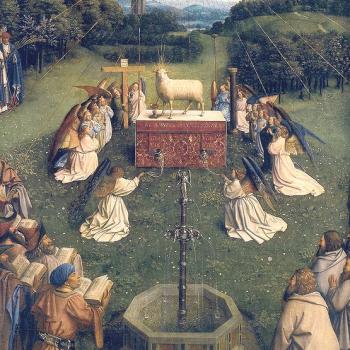This is the fourth and final installment in a series on "The Loneliness of Pastoring." Let me offer a short recap of what I've covered so far.
Part One reflected on the recent suicide of a pastor I knew and how it underscores the loneliness of pastoring. I suggested that the story of Jesus in the Garden of Gethsemane exemplifies the experience, as well as showing that Jesus understands how pastors feel. Although we seem to be alone, we are not, because Jesus is with us in our loneliness.
In Part Two, I put forth the thesis that the professionalization of ministry exacerbates aloneness among pastors. Recovering the biblical vision of ministry, in which each member of the body of Christ is a minister, might help pastors be less removed from their congregations.
Part Three explained that all pastors need safe places to tell their "secrets." They need relationships in which they can share their struggles, temptations, and fears, as well as their victories, opportunities, and dreams. In particular, pastors need close friends with whom they can share their true selves. Married pastors can open up with their spouses, though wisdom might require certain kinds of limits in marital communication about the church.
Today, I want to explore two other types of relationships that are essential for every pastor. Pastors who have these relationships not only will feel less lonely, but also will have safety nets to keep them from falling into disaster and coaches to help them excel in their calling.
A Small Group of Pastors
The first type of essential relationship is a small group of pastors: four to twelve people who meet together on a regular basis to share their lives and ministries. In this context, they can receive and offer wise counsel, accountability, encouragement, and prayer.
During my twenty-three year tenure as a parish pastor, I was in five different groups of this sort. Some met weekly, others monthly. Some were local, others regional. Some had a well-defined structure, while others were more fluid. Every group became, after a while, a safe place for my colleagues and I to share our work and our lives: the good, the bad, and the ugly.
These groups weren't perfect, of course. Human groups never are. In every group, some members took genuine risks in sharing their struggles and temptations. They found the help they needed. Yet, in every group, certain members did not share their deepest secrets, much to their own detriment. In several cases, colleagues of mine ended up engaging in behavior that led to the loss of their pastorates. Yet they never risked opening up about their temptations so that we might walk alongside them and help them walk in paths of righteousness.
For me, these groups became invaluable sources of wisdom, support, empathy, accountability, and prayer. This reflected both the high quality of the group members and my own willingness to open my life to them. I am extremely grateful for the impact that these groups had on my life . . . and still do have. Although I'm not serving in a parish now, I am part of a pastors' small group in Texas.
A Mentor, Counselor, or Spiritual Director
Every parish pastor, in my opinion, needs a one-on-one relationship with a wise Christian who can serve as a mentor, counselor, or spiritual director. The precise nature of this relationship can vary according to one's needs and faith tradition. But no matter what you call this person, I'm envisioning a relationship of intimacy and spiritual attentiveness, in which someone helps a pastor be truly transparent before God. Such a person, who would usually be older, but not necessarily, can help a pastor discern God's presence and the guidance of the Holy Spirit. It's likely that the mentor/counselor/spiritual director would, at times, also be a confessor who hears admission of sin and offers the assurance of divine pardon as well as means for accountability in the future (following the model of Jam. 5:16).
Some Christian traditions expect a pastor to have a spiritual director. This person doesn't direct the life of the pastor so much as help the pastor discern the direction of the Spirit of God. Yet most Protestant and evangelical traditions do not expect pastors to have a mentor/counselor/spiritual director and do not help pastors to find such a relationship. This, I believe, is an unfortunate mistake.
During a crucial season of my ministry at Irvine Presbyterian Church, I entered into relationship with a mature Presbyterian pastor who was a trained spiritual director. I can't even begin to explain how much he helped me see God more clearly and discern more accurately God's will for my ministry and my whole life. I could share things with my spiritual director that I had never spoken out loud before, and he helped me to see in new ways how God was at work in and through me. As I think of his role in my life, I am filled with gratitude to God.





